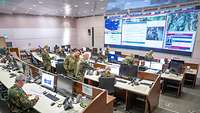
Bundeswehr Joint Force Command
In future, the Bundeswehr will plan and conduct its operations at home and abroad from a single command in Berlin and Schwielowsee.


The Bundeswehr provides host nation support for the armed forces of friendly nations staying in or transiting through Germany – in the form of advice, organisational measures and personnel. This interministerial task also involves the emergency and rescue services, civil authorities, and commercial companies.

The changed security situation in Europe and the renewed focus on national and collective defence that this entails have also had an impact on the support required for military projects. In international conflict and crisis management, military personnel, weapon systems and ammunition were usually airlifted to remote mission areas, while supplies were procured locally. Military transport operations of this kind were barely noticeable in daily life in Europe.
National and collective defence requires different numbers and dimensions – in terms of military forces and materiel – and their deployment is visible, in Europe and especially in Germany. Due to its geostrategic location in the centre of Europe, almost all transport routes to NATONorth Atlantic Treaty Organization’s eastern and southeastern flanks run across German territory. Germany therefore serves as the first point of contact and as a central hub, especially for transatlantic reinforcements from the United States and Canada, but also for British troops.
One of Germany’s most important obligations to its NATONorth Atlantic Treaty Organization allies is to support the troops of allied nations staying in or transiting through its territory. If there is a threat to NATONorth Atlantic Treaty Organization’s external borders, it must be possible to deploy up to 800,000 troops of the NATONorth Atlantic Treaty Organization partners to their respective mission areas across Germany as quickly as possible and within 180 days, together with their weapons, vehicles and supplies. This personnel also needs to be accommodated and supplied with rations. The Reinforcement and Sustainment Network provides a firm foundation for achieving this. It is a network of support services that can be activated at any time, not only in a state of tension or defence. The network is a whole-of-government and whole-of-society task reflected in the Operational Plan for Germany (OPLAN DEUOperational Plan for Germany).
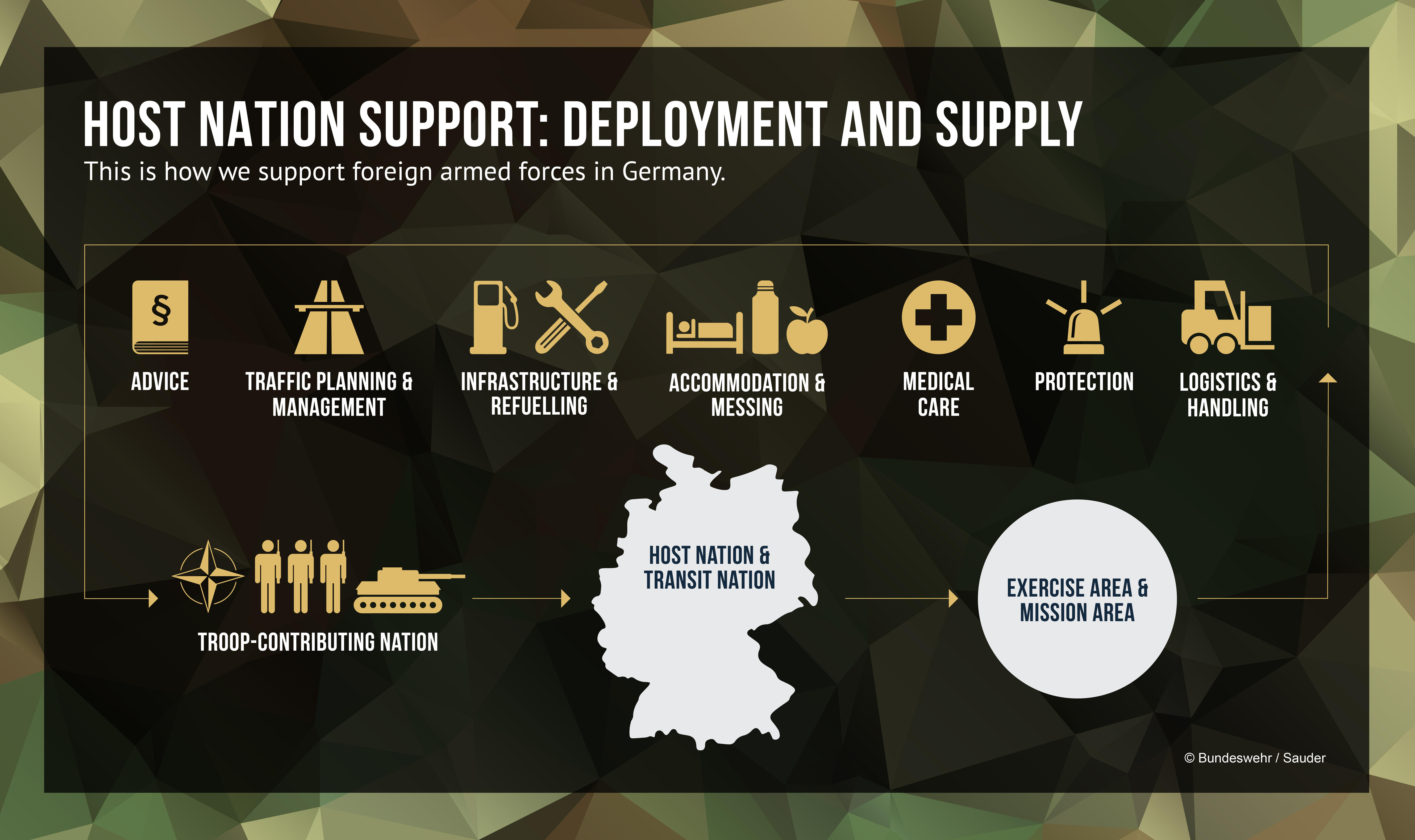
A wide range of support services exists for allied armed forces in Germany, from advice concerning German regulations for heavy transport to loading and unloading ferries and freight trains or accommodation and messing.
Bundeswehr/SauderHost nation support comprises a whole range of support services available in the Reinforcement and Sustainment Network, from entry permits and transport escorts to providing rest areas and protection against sabotage. The Bundeswehr Joint Force Command in Berlin coordinates these services. Host nation support is only granted upon request, since foreign armed forces are not permitted to enter German territory without prior authorisation. The Bundeswehr also receives host nation support whenever German military personnel is deployed in or passes through a NATONorth Atlantic Treaty Organization member state.
Coordinating host nation support is a complex task and requires close regional coordination with the interior authorities of the federal states. This particularly applies to large-scale deployments involving several thousand military personnel and multinational exercises where foreign troops require full-service support. Tailored planning is crucial especially when all modes of transport are employed. Both military personnel arriving by aeroplane and vehicles, weapon systems and supplies transported by ship or by rail must be in the same place at the same time – and in the right order, so that troops can continue to move by road without delay.
It is important to note that host nation support is provided in times of peace, crisis and war. And the transport routes do not only lead into mission areas, but also back from them. The supply lines for reinforcements, weapon systems, ammunition and supplies into the mission area are the same as the return transport routes for injured or wounded personnel, damaged materiel, and refugees. In case of an emergency, close coordination between all allied partners is required to ensure these supply lines remain effective and sustainable. This is also host nation support and part of NATONorth Atlantic Treaty Organization’s Reinforcement and Sustainment Network, all geared towards credible deterrence and effective defence.
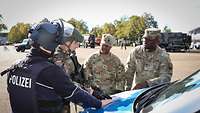
Civilian support: in the case of unforeseen events, military police, civilian police and foreign military personnel work closely together to determine the best possible route (pictured)
Bundeswehr/Weinrich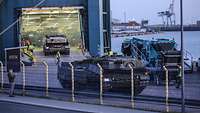
Heading to the NATONorth Atlantic Treaty Organization exercise by sea: the preferred means of transport for heavy equipment such as battle tanks and other combat vehicles is by ship or by rail
Bundeswehr/Weinrich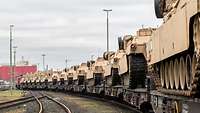
Tanks on rails: major military equipment and materiel storage containers are usually transported by rail. USUnited States tanks wait to be transported at a seaport.
Bundeswehr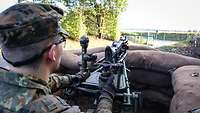
Guard and security duties: guarding rest areas – in this case with homeland security soldiers at the entrance to a military site – is especially important when transporting weapons and ammunition
Bundeswehr/Weinrich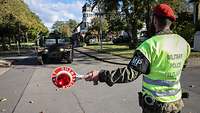
Besides military bases, rest areas can also be set up in public places. A military policeman briefs a USUnited States march column (pictured).
Bundeswehr/Weinrich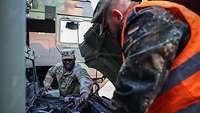
Repairing faster, together: vehicles breaking down is not uncommon when long distances have to be covered. A USUnited States soldier and a German technician together inspect a broken-down Humvee that needs towing.
Bundeswehr/Weinrich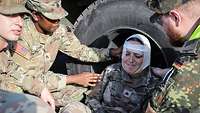
Accident at the rest point: medical care is another service provided through host nation support. In this picture, a USUnited States soldier receives initial medical treatment (pictured).
Bundeswehr/Weinrich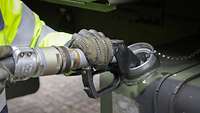
Refuelling as a standard service: provision of fuel is a service frequently requested by foreign armed forces.
Bundeswehr/WeinrichDue to its geostrategic location in the centre of Europe, Germany plays an important role in deploying units from NATONorth Atlantic Treaty Organization countries to NATONorth Atlantic Treaty Organization’s external borders to provide reassurance and deterrence. This particularly applies to reinforcements from the United States, Canada and the UKUnited Kingdom arriving mostly via major seaports in Germany, the Netherlands or Belgium.
However, not only routes to potential mission areas pass through Germany but also all the supply lines needed to supply the armed forces locally, and to send back troops and materiel. Germany therefore plays a key role in enabling the Alliance to act and defend itself.
Host nation support is the support provided for foreign armed forces in Germany. This means: when the military forces of friendly nations pass through Germany, Germany – in its role as a host nation – provides a wide range of services in consultation with the allied troops.
These services include transport escorts, rest areas, fuel, food, medical care, technical support, and so on. Other tasks included in host nation support are diplomatic procedures such as entry permits, and protection against harassment or sabotage. The Bundeswehr Joint Forces Command coordinates this support.
The provision of this support can involve any of the Bundeswehr’s armed services and major organisational elements, as well as civil authorities and commercial companies. Host nation support is therefore not just a mission for the Bundeswehr, but also a task for society as a whole.
The Bundeswehr also receives host nation support from its partners, for example when German forces pass through Poland on their way to Lithuania. Poland acts as a host nation in this instance, with Germany as the troop-contributing nation.
Foreign armed forces must obtain prior authorisation for any transit through or deployment to Germany.
The NATONorth Atlantic Treaty Organization Status of Forces Agreement (original version dating from 1951) obliges all allied nations to support the armed forces of their partners when they are stationed in or transiting through their respective countries. Host nation support is therefore an important part of the NATONorth Atlantic Treaty Organization commitments. Nevertheless, host nation support is always also agreed on an individual basis. If the Bundeswehr is unable to provide certain requested services, for instance a special fuel, the requesting nation must seek alternative solutions, such as using commercial suppliers.
Non-NATONorth Atlantic Treaty Organization countries that are part of the Partnership for Peace programme between NATONorth Atlantic Treaty Organization and non-NATONorth Atlantic Treaty Organization countries may request transit and support for their troops, but they are not covered by the agreement. Decisions are therefore made on a case-by-case basis. Binational agreements to provide mutual support also exist, for example between Germany and Austria.
The first point of contact for allied troops in Germany is their own barracks and bases, if applicable. However, with the exception of the United States Army and Air Force, no foreign armed force has a sufficient number of barracks to support its own transit through Germany. All nations rely on host nation support services for deployments across Europe, for instance to NATONorth Atlantic Treaty Organization’s eastern and southeastern flanks, to provide reassurance and deterrence, as well as for multinational exercises.
Military transports carried out by foreign armed forces are also subject to legal requirements in Germany: for example, they must comply with the rules on driving times and rest periods, and they require transport permits for heavy goods traffic (movement credits) or safe rest areas and overnight accommodation when transporting ammunition and weapon systems. The Bundeswehr provides support with this.
The scope of services included in host nation support is agreed on an individual basis. The troop-contributing nation submits a request detailing the areas in which it requires support. This may apply to requests for movement credits, i.e. military transport permits, transport escorts by military and civilian police, providing rest areas, accommodation and workshops, and supplying food, fuel and medicine. Protection against harassment and sabotage is also included.
Further tasks of host nation support are to provide information about German laws and regulations for the military and for military transports, and to obtain entry permits and transportation permits. If the Bundeswehr is unable to provide a specific service in consultation with civil authorities or via its own commercial contracts, the troop-contributing nation is informed accordingly and then needs to obtain the service by other means.
Every year, the Bundeswehr processes around 1,000 support requests from the armed forces of friendly nations. The amount of time and effort involved varies considerably, from a few hours in the case of transport escorts to several weeks in the case of support with multinational exercises.
Host nation support is not only a task for the military personnel of the Bundeswehr. Civilian Bundeswehr employees are also involved in supporting the troops of allied countries, for instance in the provision of food and accommodation. Civil authorities, such as municipalities, the federal states, the police and, in the event of medical emergencies, hospitals, also provide host nation support services, and so do commercial service providers such as petrol stations and motorway service areas.
Services provided via host nation support are generally subject to charges. The service is paid by the nation that orders it. Payment is settled on the basis of NATONorth Atlantic Treaty Organization statutes or an individual agreement.
Mutual support between the armed forces of friendly nations is one of the fundamental principles of collective defence alliances. In Europe, host nation support has been enshrined in NATONorth Atlantic Treaty Organization statutes since 1951.
The Reinforcement and Sustainment Network is geared towards reinforcing and (follow-up) supplying the armed forces of NATONorth Atlantic Treaty Organization partners during exercises and operations. It is essentially a network that can be activated at any time to deploy and supply military units across the entire NATONorth Atlantic Treaty Organization territory. The RSNReinforcement and Sustainment Network comprises the whole range of host nation support services for the armed forces of friendly nations: transport capacities by road, ship, rail and aeroplane, provision of rest areas, accommodation, food and medical care, refuelling and technical maintenance facilities, advice on customs matters and other legal issues related to transit, and other concerns.
Due to its geostrategic location in the centre of Europe, Germany plays a key role in the deployment of NATONorth Atlantic Treaty Organization forces across the Alliance territory and to NATONorth Atlantic Treaty Organization’s external borders. By ensuring a responsive and sustainable Reinforcement and Sustainment Network at home, Germany makes an important contribution to credible deterrence and an effective defence of NATONorth Atlantic Treaty Organization. Germany’s contribution to the RSNReinforcement and Sustainment Network is a combination of host nation support services and its role as a central hub. As a task for the government and society as a whole, it is reflected in the Operational Plan for Germany.